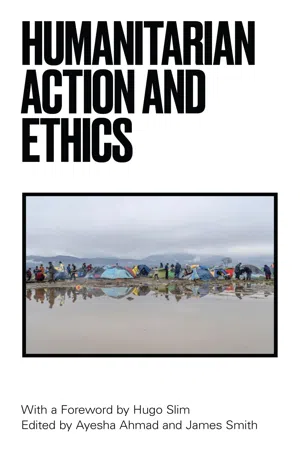
- English
- ePUB (mobile friendly)
- Available on iOS & Android
Humanitarian Action and Ethics
About this book
From natural disaster areas to conflict zones, humanitarian workers today find themselves operating in diverse and difficult environments. While humanitarian work has always presented unique ethical challenges, such efforts are now further complicated by the impact of globalization, the escalating refugee crisis, and mounting criticisms of established humanitarian practice. Featuring contributions from humanitarian practitioners, health professionals, and social and political scientists, this book explores the question of ethics in modern humanitarian work, drawing on the lived experience of humanitarian workers themselves. Its essential case studies cover humanitarian work in countries ranging from Haiti and South Sudan to Syria and Iraq, and address issues such as gender based violence, migration, and the growing phenomenon of 'volunteer tourism'. Together, these contributions offer new perspectives on humanitarian ethics, as well as insight into how such ethical considerations might inform more effective approaches to humanitarian work.
Tools to learn more effectively

Saving Books

Keyword Search

Annotating Text

Listen to it instead
Information
Table of contents
- Cover
- Praise for the book
- About the editors
- Title page
- Copyright
- Dedication
- Contents
- Acknowledgements
- Contributor Biographies
- Foreword: Humanitarian Action and Ethics
- Foreword: On the Front Lines of Humanitarian Medical Ethics
- Introduction
- 1. Difficult Decision-making, Compromise, and Moral Distress in Medical Humanitarian Response
- 2. Moral Entanglement and the Ethics of Closing Humanitarian Projects
- 3. The Outsider’s Role: Ethical Reflections from the Study of International–National Staff Relations in Development and Humanitarian Organisations
- 4. The Moral Motivation of Humanitarian Actors
- 5. Makeshift Humanitarians: Informal Humanitarian Aid Across European Close(d) Borders
- 6. Amateur Humanitarianism, Social Solidarity and ‘Volunteer Tourism’ in the EU Refugee ‘Crisis’
- 7. La Nouvelle France: Institutionalised Abuse, ‘Exception’ and Spectacle in the Exiled/Volunteer Relationship at the Franco–British Border
- 8. Ethical Challenges Among Humanitarian Organisations: Insights from the Response to the Syrian Conflict
- 9. Home and Away: Ethical Issues in Humanitarian Aid to Syrians in Israel
- 10. The Emergence of Humanitarian Failure: The Case of Haiti
- 11 Ethical Encounters as a Humanitarian Psychiatrist
- 12. One for All, or All for One: The Ethical Implications of Individual Human Rights-based and Public Good-based Frameworks in Emergency Mental Health
- 13. Ethics of Cultural Concepts and Conflicts Surrounding Disclosure of Gender-based Violence in Humanitarian Settings
- 14. The Invisible Man: The Shrouding of Ethical Issues Related to Sexual Violence Against Men in the Humanitarian Response in the Democratic Republic of Congo
- 15. Humanitarian Ethics in Médecins Sans Frontières/ Doctors Without Borders: Discussing Dilemmas and Mitigating Moral Distress
- 16. Stop Missing the Point: Managing Humanitarian Action Well
- 17. An Ethic of Refusal: The Political Economy of Humanitarianism Under Neoliberal Globalisation
- Afterword: The Ethics of Compiling a Book on
- About Zed
Frequently asked questions
- Essential is ideal for learners and professionals who enjoy exploring a wide range of subjects. Access the Essential Library with 800,000+ trusted titles and best-sellers across business, personal growth, and the humanities. Includes unlimited reading time and Standard Read Aloud voice.
- Complete: Perfect for advanced learners and researchers needing full, unrestricted access. Unlock 1.4M+ books across hundreds of subjects, including academic and specialized titles. The Complete Plan also includes advanced features like Premium Read Aloud and Research Assistant.
Please note we cannot support devices running on iOS 13 and Android 7 or earlier. Learn more about using the app